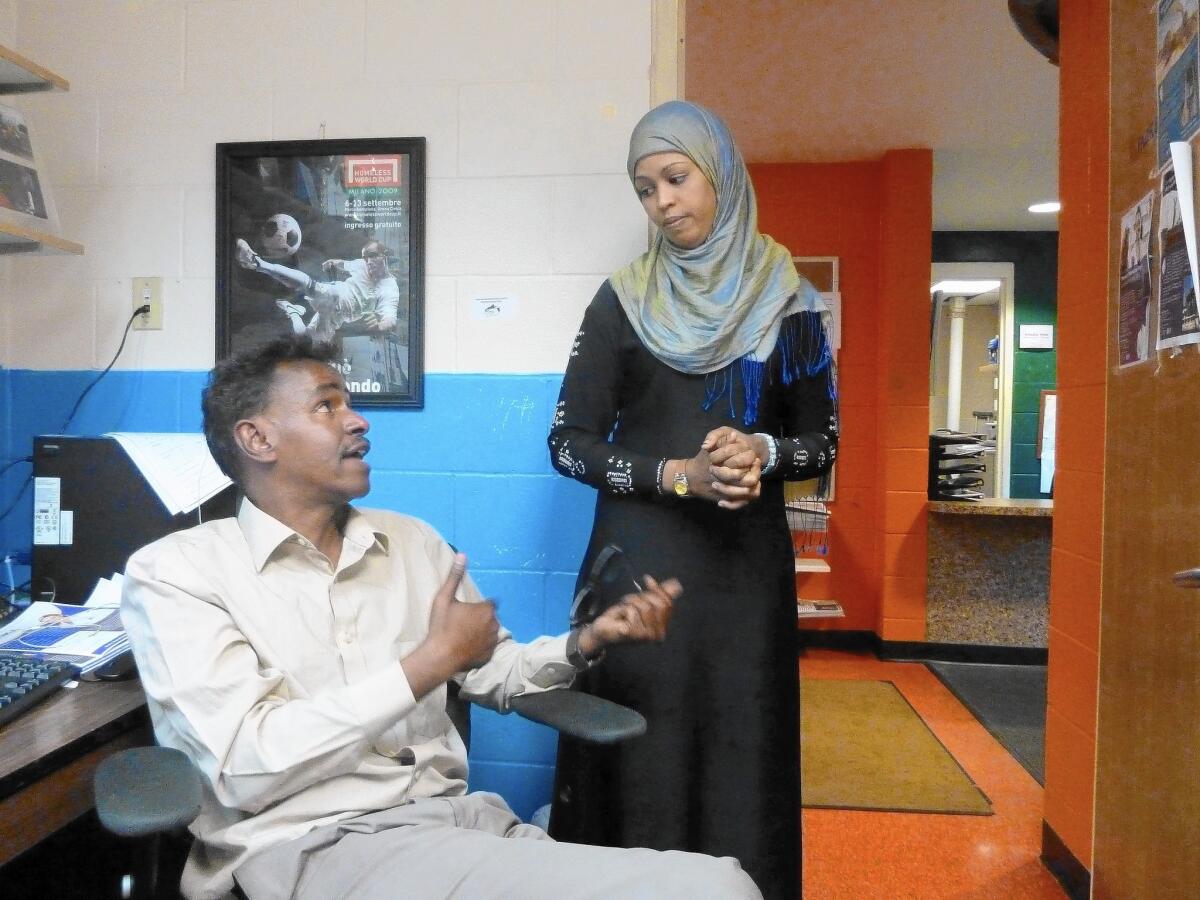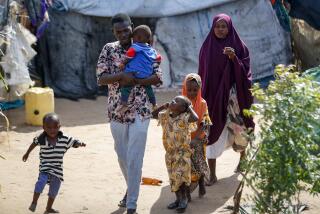Somali American fights militant Islamist recruiters in U.S. heartland

Reporting From MINNEAPOLIS â For seven years, youth leader Abdirizak Bihi has waged a personal battle against an elusive foe: religious extremists using sophisticated online tactics to lure young Somali Americans abroad as militant foot soldiers and suicide bombers.
Many of these idealistic volunteers are dead now, including Bihiâs nephew.
------------
For the record: An earlier version of this story implied that comments on the role of the FBI had been made by Kyle Loven, a chief division counsel for the agency in Minneapolis, when in fact they were made by Stevan Weine, a professor of psychiatry at the University of Illinois at Chicago.
------------
Burhan Hassan was 17 in 2008, when he was lured by a recruiter he met in a Minneapolis mosque to go to Somalia to join the militant Islamist group Shabab. The skinny teenager, who planned to apply to Harvard, was killed under mysterious circumstances as his family waged a desperate attempt to bring him home.
Bihi suspects that Burhan was killed by his Shabab allies because he wanted out of Somalia. But he will never know for sure.
Burhan is one of more than two dozen Somalis between the ages of 17 and 35 who abandoned their lives in the Twin Cities to join Islamic radicals across the Middle East and North Africa. The latest is a St. Paul teenager who left her family in August for Syria to assist the Islamic State.
For thousands of Somali parents here, all of this has created a pervasive and escalating fear: of government, of law enforcement, of the media, but especially of losing their sons and daughters to outsiders bent on waging holy war.
For Bihi, the blow of losing his own close relative to this troubling trend has hardened his resolve to combat the presence of distant Islamist battles in the heart of the American Plains.
âHe was just a good kid,â Bihi said. âHe wanted to be a doctor like many of his cousins. He was our future.â
At 49, the slender, bespectacled father of five is used to a good fight. He fled Somalia as a young man with his father, a businessman and political activist who became a government target. âHe had a big mouth and so do I,â he said. âWe speak our minds.â
Bihi works from a cramped cinder-block office in a community center that serves the needs of a Somali neighborhood called Cedar-Riverside â where working-class families pack into crowded high-rises, where women in bright African prints and colorful scarves shop at the many Somali-owned businesses, including Halal markets, and rent the latest movies from Mogadishu.
His homegrown mission against militant Islam centers on helping youths play sports as a way to resist savvy recruiters whose appeals have become sophisticated. They flood Twitter and special smartphone apps that take conversations offline. âThe concept is to create a positive alternative to these extremists,â Bihi said. âIâm in competition with these recruiters. They want my kids.â
The task isnât easy: The regionâs 50,000-member Somali community faces high unemployment, with few after-school programs. Bihi says that his neighborhood center has one after-class program for a community of 7,500 Somalis â with more refugees arriving every day.
Federal officials are calling for new ways to fight this latest national security threat among growing concern that youths indoctrinated by extremists could return to plan terrorist acts on U.S. soil. The U.S. Justice Department recently unveiled a pilot program that enlists social and mental health workers, religious leaders and police to thwart Islamist group recruiters.
Democratic Sen. Al Franken has called for such efforts to focus on his home state of Minnesota, where foreign groups have drawn a large proportion of their recruits, so much so that the Twin Cities â along with Los Angeles and Boston â will host the program.
Local Somali activist Omar Jamal insists that few outsiders have paid attention to the growing exodus of young Somalis, leaving the community to tend to its own emotional wounds. âPeople were in denial about our crisis,â said the director of the American Friends of Somalia. âIt seemed so farfetched that kids would drop their schoolbooks to go fight for extremists abroad. But nobody is denying the problem now.â
Bihi says the governmentâs help is long overdue.
Since 2007, Bihi has gone door to door for donations to buy used equipment and uniforms, and to rent soccer fields and basketball courts, often without success. âFor years, Iâve told these kids that help will come, but they say, âYouâre a good guy, but people donât care about us. Weâre just a bunch of poor Somali kids.ââ
He and a few other center organizers work without pay. Bihi, who is two months behind on his rent, does translation work to help support his family. But most of his time is spent in his tiny office, dreaming up ways to help vulnerable Somali youths here.
Every week, he says, he has to prevent one of the coaches he works with from quitting because of a lack of resources. Pointing to a punctured soccer ball on the floor, Bihi tells of how he even went online last month to appeal for funds. His response was met with just over $500, money he has already spent.
His neighborhoodâs plight demonstrates the cultural challenges as officials scramble to protect often-isolated ethnic communities like Minnesotaâs Somalis. Experts say that officials face challenges in connecting with Somali residents who fled their unstable homeland, carrying with them the emotional scars of war.
âOne study suggests that one-third of Somali mothers are torture survivors, which can have a big impact on their parenting,â said Stevan Weine, a professor of psychiatry at the University of Illinois at Chicago, who conducts research on countering violent extremism.
He said the White House plan to build community resilience didnât yet include strategies on how to address critical factors such as prior trauma, joblessness, social exclusion and lack of social services that could render areas such as Cedar-Riverside more vulnerable to radicalization and recruitment.
Some Somalis here, as distrustful of government as they are of the media, see conflicting signals from U.S. officials. While agencies promote dialogue with the community, a bill proposed by Rep. Michele Bachmann (R-Minn.) seeks to revoke passports and reentry privileges of Americans suspected of fighting overseas for Islamic militants.
Somali families fear that such a law would mean they might never again see their missing children. And many are reluctant to report disappearances to the FBI, fearing that they themselves will become the subject of a criminal investigation.
As the FBI investigates the recruitment pipeline, several Somalis â including parents of missing teenagers â have been subpoenaed to appear before a federal grand jury, activists say.
âParents live in fear of that scenario,â said Bob Fletcher, a former Ramsey County sheriff who fosters youth mentoring and parent coaching in the Somali community. âIf a child disappears, the last people they want to call are the FBI.â
Kyle Loven, a chief division counsel for the FBI in Minneapolis, said the bureau had worked hard to foster relations with Somalis. âThere are always going to be trust issues,â he said.
Weine emphasized that the agencyâs primary job is not crime prevention. âThe bureau is in charge of stopping people from committing crimes,â he said. âOnce a person steps over the line, the FBI does what the FBI does.â
Even so, Somali parents, struggling for a foothold in American culture, believe they have reason to worry.
âRecruiters seek high-achieving impressionable young people and manipulate them into feeling guilty about the wonderful life theyâre living in the West while fellow Muslims are suffering abroad,â said Mia Bloom, a professor of terrorism and security studies at the University of Massachusetts at Lowell.
Bihi has been approached by numerous Somali mothers who are petrified about their childrenâs welfare. âTheir kids have dropped out of sports and changed their behavior,â he said, responding to a cellphone that wonât stop ringing. âThe parents donât know who to trust.â
Even mosques are suspect. Several Somalis who fled Minnesota for the Middle East or North Africa attended a Bloomington mosque, which in June banned a man who had preached extremism. In a statement, the Al Farooq Youth and Family Center said it âvigorously opposes the recruitment of any persons to participate in violent or extremist activities.â
On Nov. 4, 2008, Bihiâs sister, a single mother of four, called to say that her third-eldest son was missing. Hours later, Bihiâs phone rang again. âThis time my sister said, âHeâs gone,ââ he said. The nephew, who didnât speak Somali and had showed little interest in politics since arriving in the U.S. at the age of 4, had taken his passport and computer.
More to Read
Sign up for Essential California
The most important California stories and recommendations in your inbox every morning.
You may occasionally receive promotional content from the Los Angeles Times.











